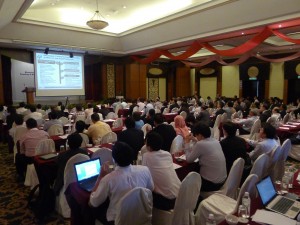 The Malaysian government announced in August this year in its Budget 2013 an additional allocation of MYR 2 billion for the Green Technology Financing Scheme (GTFS), a scheme to enable producers and users of green technology to obtain soft loan at 2% subsidized interest rate and 60% guarantee by the government.
The Malaysian government announced in August this year in its Budget 2013 an additional allocation of MYR 2 billion for the Green Technology Financing Scheme (GTFS), a scheme to enable producers and users of green technology to obtain soft loan at 2% subsidized interest rate and 60% guarantee by the government.
In addition, the recently published ease of doing business index by the World Bank’s and International Financial Corporation (IFC)’s showed Malaysia achieving top 12th position out of 185 economies, as well as number one rank (alongside United Kingdom) in terms of obtaining credit or access to finance. Backed by solid financial and banking sector Malaysia has in more traditional areas of banking, industry players are positive the financing for Malaysian biomass ventures can really take off in the long run.
This was one of the issues addressed by H.E. Luc Vandebon, Ambassador & Head of Delegation of the European Union (EU) to Malaysia at the recent Biomass Industry Networking Seminar held in Putrajaya, Malaysia, an inaugural event organized by the national biomass association Malaysia Biomass Industries Confederation (MBIC).
A moment of the biomass industry networking seminar organized by MBIC
Founded as a spin-off of the EU-Malaysia Biomass Sustainable Production Initiative (Biomass-SP), a development cooperation project funded by the European Union (EU) under the SWITCH-Asia Programme, MBIC was brought together by a group of small and medium enterprises (SMEs) selected under the flagship initiative of Biomass-SP, the EU-Malaysia Biomass Entrepreneurs Nurturing Programme (EUM-BENP).
H.E. Luc Vandebon was present at the event to deliver a seed grant of EUR 10,000 for MBIC. The grant is contributed by the EU under the SWITCH-Asia Programme, as part of the EU’s effort to establish sustainable environmental and business partnership between Malaysian biomass stakeholders and the EU.
“Biomass as a renewable energy source is a specific policy that both the EU and Malaysia have clearly shown to be a top priority. The EU is keen to engage with Malaysia on promoting biomass, both in terms of policy but also in terms of technology transfer. We also want to take concrete steps to fight climate change by cooperating on technical level” concluded H.E. Luc Vandebon.
Seeing an encouraging participation of more than 120 participants from over 60 companies including SMEs, government-linked companies (GLCs), plantation companies, technology providers and commercialization entrepreneurs, YB Dato’ Hamzah Zainudin, Deputy Minister of Plantation Industries and Commodities who officiated the event regarded the networking seminar as a much needed platform to discuss pertaining issues and challenges in the biomass industry in Malaysia, which represents a sizable potential given the country’s position as one of the world’s largest producer of palm oil.
“Apart from palm oil industry which produces up to 80 million tonnes of biomass feedstock annually, the timber and rubber industry with a total export value of RM20 and RM14 billion respectively, generate a considerable amount of useful biomass residues such as wood chip and saw dust,” he said.
The palm oil industry is the largest producer of biomass. The growing potential of biomass, if utilized effectively, coupled with public-private partnership and accelerated technology development for utilization of biomass could easily increase the palm oil sector’s contribution to national gross domestic product by fifty percent.
However, he also noted the critical challenge faced by many biomass projects developers; biomass feedstock security of supply and price stability. “There should be a concurrent growth between the biomass supply and the depending industries so the excessive mismatch of supply and demand could be minimized as any imbalance may affect viability of biomass projects.”
According to MBIC President, Dato’ Leong Kin Mun, the confederation is currently working to address the very issue by planning a large scale ground survey among major biomass feedstock owner especially palm oil mills, saw mills and rice mills, in order to assess actual availability and current active utilization activities of biomass feedstock such as empty fruit bunch (EFB), rice husk and saw dust.
In addition, they are also working on another partnership initiative with Association of Banks Malaysia (ABM) to address issues in access to finance, by sharing latest development in biomass industry with commercial financial institutions (FIs) focusing on 8 biomass business models i.e. biomass for energy, eco-products, agriculture such as biofertiliser and animal feed, geotextile, biochemicals, etc.
The confederation hopes by familiarising the finance sector in Malaysia with innovative and green projects model involved in biomass commercialization, they could unlock huge financing potential for such projects in the long run.
Next year, in collaboration with Biomass-SP, MBIC will be hosting another international conference on biomass, hopefully repeating last year’s success in welcoming over 600 delegates from 29 countries in the EU and Asia Pacific region.
“We hope to leverage on a platform of its members the network and business partnership, knowledge and best practices, technology development and access to financing as well as market access opportunities in the local, regional and global biomass market”, he concluded.
For more information about Malaysia Biomass Industries Confederation and Biomass-SP, please visit www.biomass.org.my and www.biomass-sp.net.
This post was written by Nurhidayati Abd Aziz, BiomassSP



